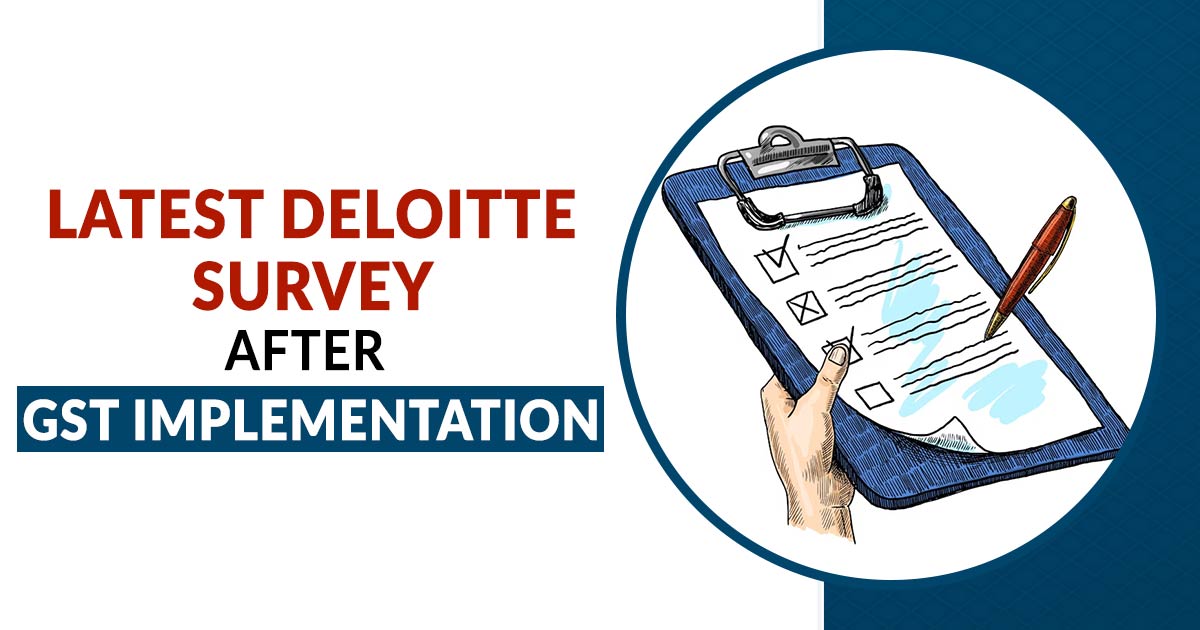
In this post, we have discussed some of the key elements examined in the online Deloitte Survey 2023. The Goods and Services Tax (GST), introduced in July 2017 as India’s most substantial tax reform post-independence, has completed six years since its implementation. This reform has brought about noteworthy changes in businesses, enhanced supply chains, and given clarity to the perception of India as a favourable business destination for both companies and countries.
What is Deloitte Survey 2023?
An online survey was conducted to ascertain the industry’s point of view on the GST journey so far and to understand future expectations. The survey included opinions of senior leaders from various industries and types of companies, generating 612 responses, including 21% from Micro, Small, and Medium Enterprises (MSMEs).
The survey findings show that a significant 94% of respondents from diverse industries expressed a positive sentiment toward GST. They recognize that the government’s recent proactive measures, majorly in simplifying compliance, have been pivotal in creating a positive GST experience.
As the GST system is progressing and appreciated by tax professionals, looking forward, India Inc. believes that the next phase of the GST reforms should be brought into the system to improve the Ease of Doing Business (EoDB), find a solution to the legislative puzzle, and to give a momentum to India’s growth story.
Key Elements Discussed in Deloitte Survey 2023
Listed below are a few of the important elements discussed in the Online Deloitte Survey 2023:
Simple Rule for Exporters Under Law
78% of respondents referred to it as much required implementation. For example, as the Central Board of Indirect Taxes and Customs released an informed circular in September 2021 elucidating doubts on the purview of intermediary services, the positive outcomes are yet to be seen with particular categories of exporters in the IT/ITeS and data hosting service domain still in question, which led to delay in litigation and in a refund that ended up the firms facing working capital blockages. Many countries such as Australia, Singapore, the UK, China, the EU, Russia, Netherlands, New Zealand, Ethiopia, and the US (Hawaii only) adhere to the destination principle of intermediary services.
India’s services exports surged by a remarkable 26.6% in the fiscal year 2023, recording $322 billion. The SEPC anticipates that this figure could touch the $400 billion mark in fiscal year 23. Concerning these impressive numbers, the government might explore the option of revisiting export regulations and eliminating any exceptions, in order to support the growth of our leading export services sector.
GST Amendment on Deemed Supplies
Regarding the taxation of deemed supplies, a significant 73% of respondents expressed support for a proposal to amend regulations to eliminate the imposition of GST on deemed supplies when services are imported under the reverse charge mechanism, where the recipient is eligible for full input tax credit (revenue neutral) which would be aligning with international VAT laws, particularly those of the EU.
This matter has sparked debates due to the lack of clarity surrounding the commercial exploitation principle, which triggers tax liability in such transactions, leading to litigations and inquiries.
Release Working GST Capital
Over 80% of businesses accorded that the exchange of cash ledgers for CGST and IGST among “distinct individuals” has effectively facilitated transactions within organizations and enhanced the efficient utilization of cash balances.
Intending to unlocking of working capital for taxpayers, 77% of survey participants expressed support for modifying regulations concerning the transfer or cross-utilization of CGST credit between separate entities. This proposal holds revenue neutrality for the government and would lead to the unblocking of several thousand crore rupees worth of accumulated Input Tax Credit (ITC).
Another recommendation is to refund GST credits in a manner similar to the refund process for end-of-year state VAT credits, this proven and globally aligned approach that should be integrated into GST law.
Lifting of GST ITC Regulations
With 68% in support of the amendments, another aspect concerning credits is the elimination of limitations on credit availability in relation to employees and the establishment of commercial infrastructure. These restrictions notably affect sectors with substantial infrastructure and investment, such as telecommunications, warehousing, logistics, and e-commerce. Given the anticipated economic growth in FY23, which necessitates infrastructure investments and job creation, this aspect attracts consideration. Additionally, the government could explore this avenue given the positive revenue momentum.
Final: As we step into the seventh year of the GST regime, it becomes pivotal to address prolonged issues and hurdles while embracing forward-thinking ideas. By implementing suitable reforms, India can unlock the complete potential of GST, enhance economic growth, enhance tax compliance, and further improve the ease of doing business.








